#like I didn’t find Billy and daisy fascinating because I ship them
Explore tagged Tumblr posts
Text
Nine times out of ten I don’t have a problem with adaptations being slightly different from the original source material as long as they still understand the assignment but I absolutely HATE that they had Billy initiated the kiss!! Because Daisy is the reckless one. Daisy is the messy one. Billy is the one with self control. It just feels out of character because they’ve built up that Billy has a lot of self control (especially after rehab). And not just book Billy versus show Billy either. The show set Billy up as having a lot of control and they just nipped that bud. And god forbid this man loves his wife!!! Like god forbid Billy and Camila really love each other and are devoted to each other!! The whole tension between Billy and Daisy in the book is that they see themselves in each other but they know they are not good for each other! To me the writers completely missed the ball on that.
#daisy jones and the six#daisy jones and the six spoilers#maybe they’ll turn in it around by the end#but it just ruins the tension imo#like I didn’t find Billy and daisy fascinating because I ship them#and I want them to be together#heck no#i find them fascinating because they’re so alike#but they’re so wrong for each other#it may be boring#but Billy and camila are it#they love each other#there’s no reason they should have any conflict!
10 notes
·
View notes
Text
2001: A Space Odyssey (1968) Review
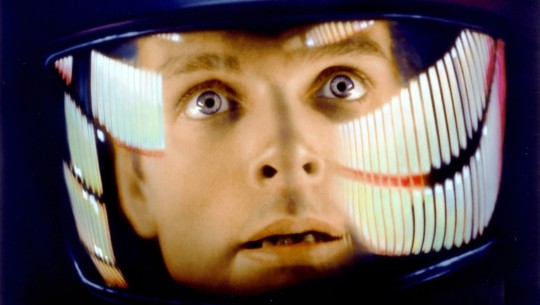
(This movie review includes big spoilers.)
2001: A Space Odyssey is a difficult masterpiece. There are so many books, documentaries, articles and interviews about it. I'm not sure what a review by little old me will contribute to the zeitgeist, but here we go.
I'm going to date myself, big time. I was an adolescent when I saw this movie in the theater. And it wasn't a tiny cineplex, because we didn't have those back then; it was one of those huge old theaters with an immense screen. 2001: A Space Odyssey blew my mind. My mother, who liked science fiction even though she was never into it as much I was, was blown away, too. As we were leaving, she said something like, "I have no idea what that movie was about, but I loved it." I said, "Me, too." And then we spent a couple of hours talking about how it looked, how it sounded, what might have happened and what it could possibly mean. This movie made us think, and talk. It was one of my most memorable childhood movie experiences, possibly the best I ever had with my mother.
And yet, while 2001 consistently makes top-ten-of-all-time movie lists, some people think it is monumentally dull. I will readily admit that it is 180 degrees away from films like Star Wars. When 2001 was released, the critics fell into separate camps on complete opposite ends of the spectrum, as in either "It's absolutely brilliant," or "It might be the worst movie ever made." I find it fascinating that, even after all these years, people come away from this movie with such vastly different impressions.
2001: A Space Odyssey was produced and directed by the brilliant and controversial Stanley Kubrick, and it was written by Kubrick in collaboration with one of the great science fiction novelists, Arthur C. Clarke. It took a long time to make this movie, and Kubrick was obsessed with getting every detail absolutely perfect, a monumental feat when you consider that it was pre-CGI and every single object and scene in every frame had to be imagined, considered, designed and created before it was filmed.
I feel like my vocabulary is inadequate when it comes to describing how this movie looks. Every shot is so perfectly framed, the photography so stark and imaginative. The space stations and ships, especially Discovery One, look real, functional, and exquisitely beautiful. I've always wondered if Kubrick deliberately created ships that looked like they had faces and space helmets that resembled animal heads, or if it was a happy accident.
Much of the movie has no dialogue and when it isn't silent, it is accompanied by disturbing choral vocalizations, the stunning and majestic "Also Sprach Zarathustra," or exuberant classical music. I'm pretty sure no one had ever paired classical music with science fiction before 2001. There are other memorable sounds, too: alarms, electronic shrieking, the grunting of the apes, the breathing that is all we hear from Dave while he is trying to shut down Hal.
2001 has three distinct sections, with the third being the longest and most memorable.
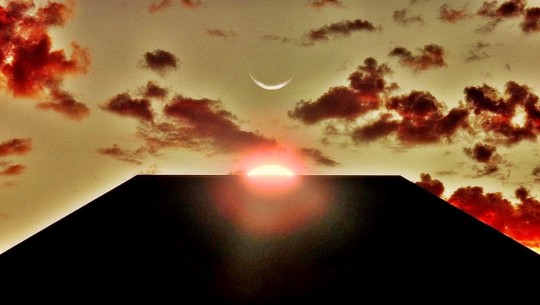
I don't have a lot to say about the first section, in which a mysterious black monolith somehow changes our starving ape-like ancestors into tool users. Except that the ape man (he has a character name: Moonwatcher) tossing the bone into the air that turns into a spaceship might be the most brilliant segue in the history of the movies.
Four million years later, humans uncover a black monolith buried on the moon that sends a radio transmission to the orbit of Jupiter. The shuttle slowly docking with the partially constructed space station to the accompaniment of a Strauss waltz is spectacular. So is the look of the interior of the space station which is peppered with familiar corporate names, most of which have survived the sixties. I've always loved how the beauty of technology created by human beings is given as much weight and attention in this movie as the beauty of nature, space, the stars and the planets. I particularly liked the symbolism of a pen, another extremely important human tool, floating in the air like the ship floating in space.
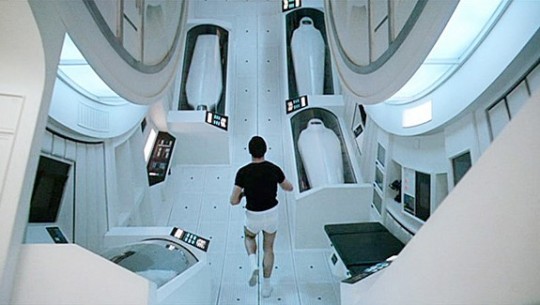
Eighteen months later, the space ship Discovery One with five astronauts on board is nearing Jupiter. Three of the astronauts are in suspended animation, so the action centers on the other two: Dr. David Bowman (Keir Dullea) and Dr. Frank Poole (Gary Lockwood), plus the HAL9000 computer, the artificial intelligence that runs the ship. Dave and Frank both come across as real astronauts, highly trained and even-tempered professionals who stay calm even in life and death situations. Which is what they soon find themselves in as Hal's conflicting instructions cause him to go mad.
Hal is so pleasant and amusing at first with the banter and the chess, although what he is about to do is foreshadowed since Hal's point of view always shows Dave and Frank as distorted. (There is also foreshadowing when Dave and Frank are shown sleeping in their coffin-like beds.) Their extreme isolation is highlighted during the taped interview with the BBC when we learn that Discovery is so far away that it takes seven minutes for a transmission to reach Earth.
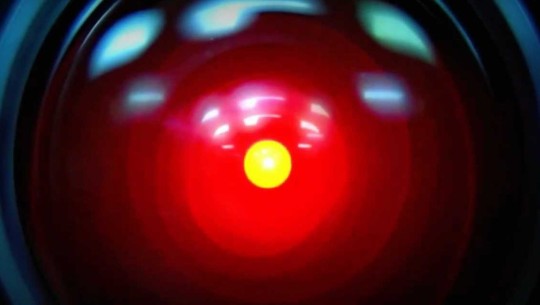
The Hal sequence is undeniably the edge-of-your-seat part of the movie, as Dave and Frank slowly realize that their soft spoken, efficient, all-powerful computer is lying to them. Although the constant close-ups of Hal's "eye" are undoubtedly creepy, Hal's voice is so melodious and calm -- an excellent vocal performance by actor Douglas Rain. I remember how shocked I was the first time I saw this movie when Hal eavesdropped on Frank and Dave in the pod by reading their lips. Humans just don't expect the tools they create to turn on them. Does Hal have genuine emotions? Is he just simulating what he was taught? What would be the difference?
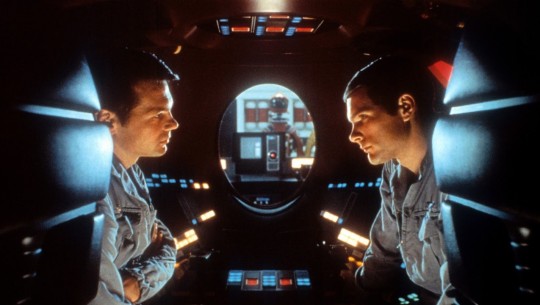
After Hal kills Frank, we can see the patterns of light and shadow playing over Dave's face as he nearly succumbs to panic, realizing that he must either expose his naked face to vacuum in order to get back into the ship, or die outside in the pod. I've always loved the disconnect scene where Dave, wearing a mismatched green helmet on top of his red space suit, won't respond to Hal's apologies, questions and suggestions while he carries out the complex actions that will kill Hal. All you can hear of Dave is his breath as Hal degenerates into a baby computer and sings a song ("Daisy") that was taught to him by his creator. Interesting parallel, when you consider what ultimately happens to Dave.
Dave completes the journey alone, and appears to take a pod into the monolith that is orbiting Jupiter. What is Dave seeing during this "trip" in the most bizarre of sixties psychedelic colors? Is he seeing the home world of the beings that created the monolith?
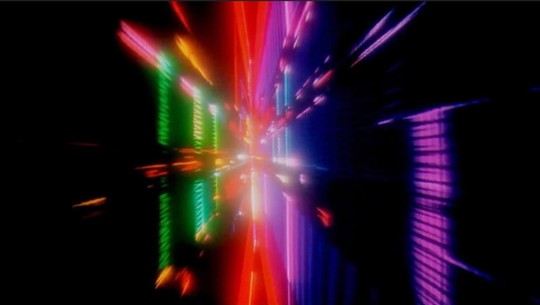
Since the monoliths were deposited in our solar system four million years ago, it seems unlikely that the aliens were still hanging around. I've always assumed that they left their automated monolith "seeds" and moved on. I've also always wondered -- what did the powers that be on Earth think that the astronauts were going to do with that monolith? Go up and knock?
It's also fascinating to conjecture what is happening during the surreal, strangely lit bedroom scene at the end. Dave appears to see older versions of himself, and then he becomes each older version of himself: quite elderly and in a robe eating dinner, visiting what looked like a fully appointed bathroom, in the bed as he breathes his last before turning into a strange space infant floating above the Earth. Did Dave spend the rest of his life in a real place (unlikely) or was it simply a mechanism that took his mind to the end of his life so that he could be reborn?
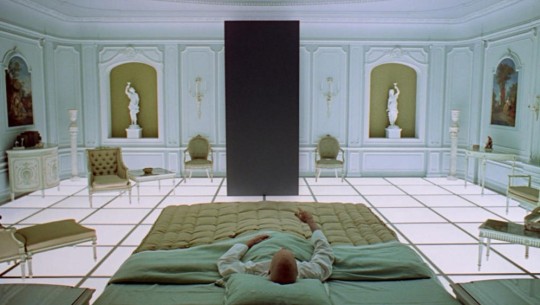
What does Dave become? Is it the fate of the entire human race, or is it just him?
There is a 1984 sequel to this movie entitled 2010 that doesn't really answer this question. At least it's based on a book also written by Arthur C. Clarke, so there's that.
Bits:
— Even though the five astronauts on the Jupiter mission are all white males, Heywood Floyd runs into several colleagues on the space station, three of whom are women, and obviously some of whom are Russian.
— BBC 12. Loved that.
— I also loved the zero gravity toilet with the very, very long list of instructions on how to use it. Unspoken was how uncomfortable and difficult it would be for the user to absorb and follow all of those instructions when they really had to go.
— Gary Lockwood, who played Frank Poole, was also featured in the second Star Trek pilot. I had a pleasant encounter with him at a Star Trek convention, which I related at the bottom of my review of "Where No Man Has Gone Before."
— Dave: "Open the pod bay doors, Hal." Hal: "I'm sorry, Dave. I'm afraid I can't do that." I use "I'm sorry, Dave" a lot in my real life.
— Hal: (trying to talk Dave out of turning him off) "I feel much better now. I really do. Look, Dave, I can see you're really upset about this. I honestly think you ought to sit down calmly, take a stress pill and think things over." Laugh out loud.
Every few years, I watch this movie again. It's such a rich and complex motion picture that I inevitably see something I never noticed before. Four out of four pod bay doors, of course.
Billie Doux loves good television and spends way too much time writing about it.
#2001: A Space Odyssey#2001#Stanley Kubrick#Arthur C. Clarke#Hal 9000#Dave Bowman#Frank Poole#Doux Reviews#Movie Reviews#something from the archive
4 notes
·
View notes